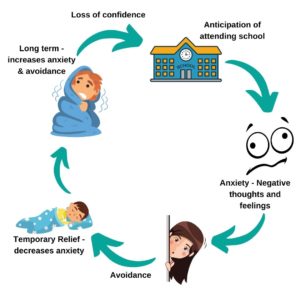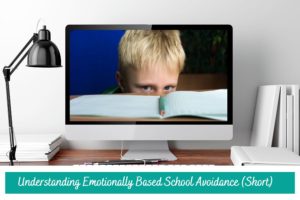What is Emotionally Based School Avoidance?
Emotionally Based School Avoidance (EBSA) refers to a child or adolescent who has difficulty attending school. The attendance at school creates uncomfortable emotions such as stress and anxiety and this can cause both physical and emotional symptoms.
The difficulty with Emotionally Based School Avoidance is that avoiding school escalates the feelings of anxiety, and this can further exasperate school refusal and lowered attendance.
Emotionally Based School Avoidance is not the same as truancy, and needs to be carefully, compassionately and considerately managed to work WITH the child and their family.
When a child experiences emotionally based school avoidance, they experience high levels of negative emotions surrounding school, this can include:
- Anxiety
- Fear
- Panic
- Negative thoughts
- Catastrophising
- Physical symptoms such as nausea
The symptoms that a child feels are very real for them, and are both emotional and physical, they can be extremely distressing. Avoidance is used to reduce the anxiety, it is a natural response to the discomfort, whereby, the brain attempts to move us to safety. However, when the child needs to return to school, the feelings of anxiety increase further and this creates a distressing cycle for the child which becomes difficult to manage.

Early Warning Signs of School Avoidance include:
- Complaints of physical symptoms related to school e.g. stomach aches, headaches, nausea
- Becoming withdrawn
- Reduced social contact or interactions in or out of school
- Reluctance to attend school
- Anxiety based thoughts – making predictions of what ‘will happen’
- Catastrophizing
- Hypothetical worries ‘what if’
- Refusal to attend particular lessons
- Negative conversations about school / lessons / teachers
- Refusal to attend school
- Showing emotional distress at attending school
- Becoming agitated or aggressive about attending school
- Frequently leaving lessons or school without permission
- Threatening to self-harm if made to attend school
- Complaints of feeling hot / fast heart rate / ears throbbing
Challenges to re-engagement
- However, for some children, issues which affect their engagement with support include:
- Feeling that adults do not believe how they feel
- Feeling judged or criticised
- Feeling unheard or unconsidered
- Feeling labelled or judged
- A belief that EBSA is a ‘choice’ being made
- Being shamed or highlighted when they return to school/lessons § Not being part of the assessment and planning for return
- A lack of understanding of their needs / feelings
Want to learn more?
If you want to learn more about Emotionally Based School Avoidance, our Short Course is now available, find it here
If you would like a more in depth knowledge, watch out for the updates about our LONG course which specialises in the physiology and strategies to support Emotionally Based School Avoidance.
© Dandelion Training and Development – All Rights Reserved


